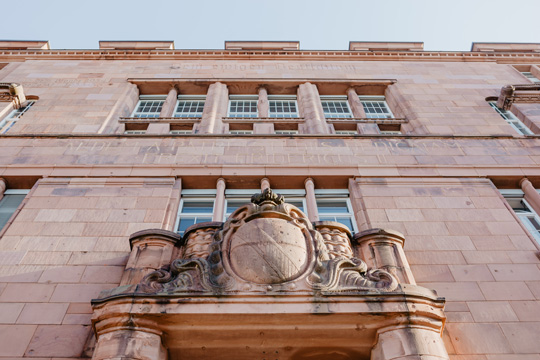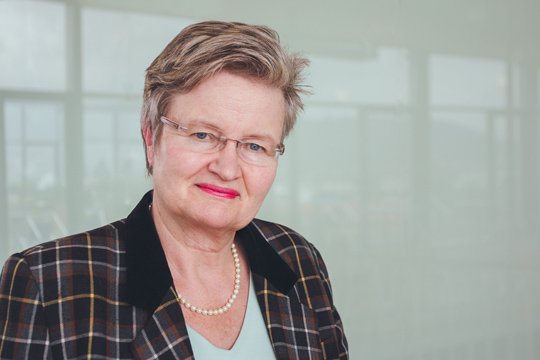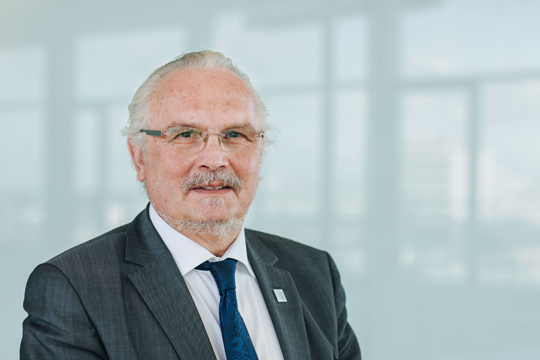Strong Pillars
Freiburg, Dec 01, 2020
Research and teaching: These are the two most important pillars of any university. Prof. Dr. Juliane Besters-Dilger from the Department of Slavic Studies served as the Vice-President of Academic Affairs for six years, while Prof. Dr. Gunther Neuhaus from the Biology Department served as Vice-President of Research and Innovation for eight years. Together, they have helped to set the course for the University of Freiburg and have been responsible for key developments and successes in their areas. How do they look back on their terms in office? Nicolas Scherger and Rimma Gerenstein talked to them about their time in office.
 Photo: Sandra Meyndt
Photo: Sandra Meyndt
Prof. Dr. Besters-Dilger, Prof. Dr. Neuhaus, you have spent many years helping to set the course for the University of Freiburg. How would you describe this experience in two words?
Juliane Besters-Dilger: “Wealth” and “dialogue.” What I hadn’t realized before I became a vice-president was that the University of Freiburg not only offers a wealth of fields of study, but also of interdisciplinary collaboration and knowledge transfer to society. All of my first year was essentially about learning to see the University with different eyes. I also realized that progress is not possible without a dialogue with the different departments and faculties. We have to work together as partners, because decisions made from the top down aren’t effective in academic affairs.
Gunther Neuhaus: My two words would be “challenge” and “pride.” When you’re a vice-president, you’re no longer solely a researcher in your field; you’re also responsible for the entire University and all its disciplines. That was a challenge in the beginning, but it energized me. I’m proud because we have excellent scholars and researchers working at our University. You can see this in the grant applications written by individual scholars as well as in the collaborative projects – like the clusters of excellence and the collaborative research centers. This is also true for the entire range of disciplines – from the humanities and social sciences, to biology and medicine, all the way to engineering.
What successes are you especially proud of when you look back on your time in office?
Juliane Besters-Dilger: Essentially, I had three major responsibilities. The first was the transition from the teacher training degree (Lehramt) to bachelor’s and master’s degrees. We managed to do this successfully together with the University of Education, with the result that we established the joint School of Education “Freiburg Advanced Center of Education” (FACE). According to other colleagues I talked to in Baden-Württemberg, this did not go so well in other places. The second was the system accreditation. In March 2020, we were granted permission to accredit our own degree programs, instead of this having to be done by an external agency. This was a comprehensive process that demanded a lot of everyone, but it also granted us more autonomy. The third task concerned a very relevant topic today: digitization. We began laying the groundwork for this already in 2017, when we conducted a survey at the University. According to the results, 80 percent of all faculty staff and students said they wanted more online instruction. The students were in favor of asynchronous courses, while teachers wanted more support and assistance. Then we started the co-creation process in which members of the University’s different status groups worked together toward a Strategy for Digitization in Teaching, which we passed in May 2020. By then, we were in the middle of the coronavirus pandemic. It was a historical coincidence.
 Juliane Besters-Dilger is in favor of hybrid models of instruction. She says, “That would be a huge step forward and would help many students.”
Juliane Besters-Dilger is in favor of hybrid models of instruction. She says, “That would be a huge step forward and would help many students.”
Photo: Sandra Meyndt
Gunther Neuhaus: I was especially pleased about the clusters of excellence. It was wonderful to see how they developed from an initial idea to a funding program in the Excellence Strategy. That was definitely one of the University’s greatest successes, along with all of our collaborative research centers, which were able to secure funding in the last eight years. There were other great successes as well. Together with Prof. Dr. Bernd Kortmann, we managed to transform the Freiburg Institute for Advanced Studies (FRIAS) into a strategic vehicle for the entire University – one that everyone approves of. We also initiated a collaboration unique to all of Germany when we joined forces with the Fraunhofer Gesellschaft to create the Sustainability Center and INATECH (Department of Sustainable Systems Engineering). However, I am particularly proud of the great team that I built up over the last eight years – a team of colleagues who see themselves as dedicated service providers for research. None of this would have been possible without them.
What was your greatest challenge?
Juliane Besters-Dilger: The coronavirus pandemic. It happened at the end of my term, and it had an enormous effect on academic affairs. We did absolutely everything we could to move the summer semester 2020 to online instruction as quickly as possible. The survey we conducted this summer showed that both faculty members and students were satisfied with the quality of the transition overall. Then the State of Baden-Württemberg passed a new coronavirus ordinance on July 1 that allowed in-person instruction again. From that moment all the way to October, I spent countless hours working with the faculties, the University’s senior administrators, and my team so that we could come up with a plan for offering face-to-face instruction in the winter semester. We even rearranged classrooms for hybrid instruction, which is especially useful for students who cannot attend class for various reasons. And then came November 1st and the new coronavirus ordinance issued by the state. I read that fatal sentence: “In-person instruction will be suspended.” All that work had been for nothing. We had to switch back to remote instruction. Still, I hope that we can have some in-person courses in the summer semester 2021.
Gunther Neuhaus: My biggest challenge was the applications for the clusters of excellence. Among the many things I learned was that you have to start this process early. Perhaps we were a bit late last time. It would have been great to assist with an application with the knowledge I have today. Still, during my time in office, we increased our focus on several fields within certain faculties – for example in particle physics – as well as across faculties in our eight profile fields. This has laid the foundations for future cluster applications.
Has your image of the University of Freiburg changed over the years?
Juliane Besters-Dilger: Of course. I knew the University very well from before. I spent 13 years at the University of Vienna before I returned to the University of Freiburg in 2007. At that time, I had this image of the University of Freiburg as being strong in the humanities, medicine, and law. It wasn’t until I became a vice-president that I got to know the whole breadth of the University – for example, I’m extremely impressed by the Faculty of Engineering. I was also not familiar with the University College Freiburg, and the more I learned about it, the more convinced I became by the ideas behind it and its amazing students. And last but not least, I also learned about our academic and internal continuing education. It is important that we continue to develop this is future-oriented program at the University.
Gunther Neuhaus: My image of the University hasn’t changed. I have always seen it as a comprehensive university that has been leaning more and more toward a European and global university over the past eight years. You can see this in Eucor – The European Campus and in our key partnerships with other universities. The seeds for this were planted at the University beforehand, however. We senior university administrators just needed to get the ball rolling and to move things forward.
Did you sometimes miss the days when you were doing research in the library or in the lab?
Juliane Besters-Dilger: I didn’t completely stop doing research when I took office. I completed a research project during my first two years, then I served as a PhD advisor and examiner for a while. Finding a balance between being a vice-president and researcher was very difficult during that time, however, so I didn’t really miss it. What I really missed was teaching and interacting with students. The Department of Slavic Studies is small, and we have a very familiar and friendly atmosphere. Once in a while, I’ll run into one of my old students on the street who’ll say to me, “Professor Besters-Dilger, when are you going to come see us again?” Now I have a reason to: I’ll be returning to Slavic Studies to do research this December as part of a project on historical linguistics.
Gunther Neuhaus: To be honest, I did miss it, but not the laboratory so much. The first few years, I definitely missed teaching. I really enjoyed being a university professor, giving lectures and being a lab instructor. But going back to the lab became unrealistic after one or two years. In the natural sciences, you have to constantly read the latest journals in your field and stay up to date, or else you’ll be left behind. That’s why I’m happy I decided to concentrate on being a vice-president the last few years before retirement.
 It’s important to take stock of things on a regular basis. Gunther Neuhaus encourages the University of Freiburg to ask itself continually what its strengths in research are and what kind of profile it wants to have.
It’s important to take stock of things on a regular basis. Gunther Neuhaus encourages the University of Freiburg to ask itself continually what its strengths in research are and what kind of profile it wants to have.
Photo: Sandra Meyndt
What would you want to see happen in teaching and research at the University of Freiburg in the future?
Juliane Besters-Dilger: I hope that we don’t forget everything we learned during this coronavirus pandemic when things go back to normal. It would be ideal if we could combine the best of in-person instruction and online instruction. I’m thinking about hybrid forms that would make it possible for students who aren’t living in Freiburg, for example, to attend a course without difficulty. That would be a huge step forward and would help many students.
Gunther Neuhaus: I hope that research continues to develop on the path it is on now, and that the University will set specific goals and ask itself continually what its strengths are in research and what kind of profile it wants to have. I especially hope that the humanities and social sciences will work more closely and more often with the natural and engineering sciences from now on. That’s my vision for the future.

